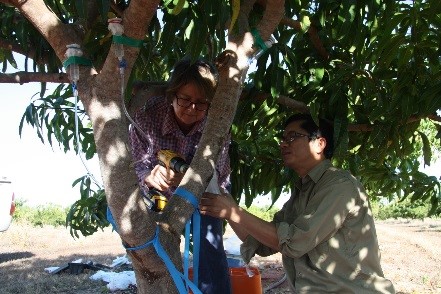Generating labelled leaf litter to follow nitrogen movement in soil under mangoes
Jo Tilbrook, Research Scientist, and Tony Asis, Agronomist, Darwin

Figure 1: Jo and Tony infusing 15N into the xylem
Understanding the turnover of nitrogen N from mango litter decomposition into the soil requires isotopically enriched (15N) leaf litter. This is usually achieved through soil or foliar application of fertilisers, but for trees such as mango, the process is slow and a significant amount of expensive labelled N fertiliser is lost to the environment. A rapid labelling method to obtain direct and quantitative information on leaf uptake of nitrogen derived from fertiliser (NDFF) within a limited time is being developed. In this study the team is testing a xylem infusion technique to rapidly create 15N labelled mango litter. While there are risks to the tree; N toxicity, phloem death or infections, the risk mitigations in the methods are successful so far. Total leaf N of a tree is estimated and a calculated amount of labelled fertiliser in solution is infused into branch xylem over several hours. A week later the leaves are collected for processing and analysis. The pending data will indicate what quantity of labelled fertiliser is needed to generate litter with sufficient 15N enrichment to follow soil N mineralisation and gas emissions as the litter decomposes.
The leaves on Kensington Pride mangoes at Katherine Research Station (KRS) are being labelled via infusions of 15N fertiliser in solution into branch xylem tissue. After drying, the labelled leaf litter will be placed on soil under mango trees to decompose while soil N gas emissions and mineralisation are quantified.
This project is supported through funding from the Australian Government Department of Agriculture and Water Resources as part of its Rural R&D for Profit program, the Northern Territory Government Department of Primary Industry and Resources, Queensland University of Technology’s Institute for Future Environments and Hort Innovation Limited. In-kind support is also provided by the Australian Mango Industry Association Inc.
Give feedback about this page.
Share this page:
URL copied!